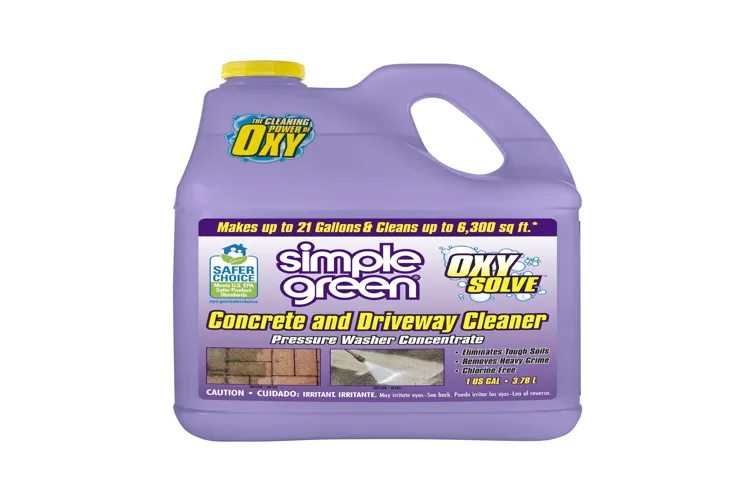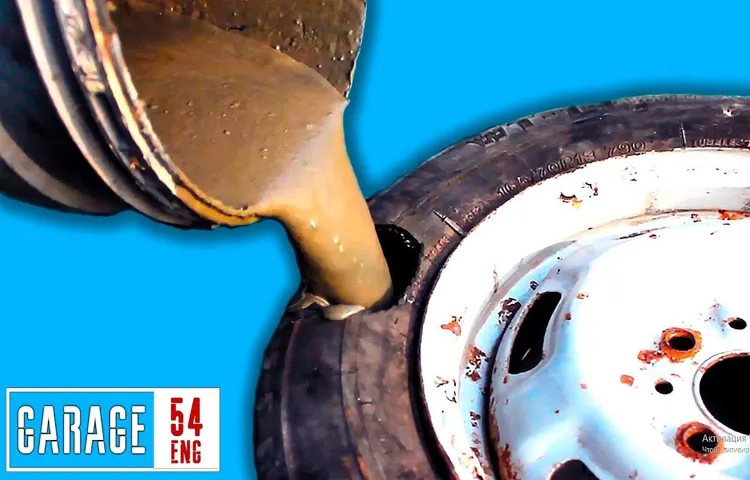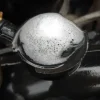Do you have unsightly black tire marks on your concrete driveway or garage floor? Don’t worry; you’re not alone! It’s a common problem that many homeowners face, but there are ways to remove those pesky marks and make your concrete look fresh and new again. First, let’s discuss what causes black tire marks on concrete. It’s the result of the rubber in your car tires rubbing against the concrete surface, leaving behind a dark, unsightly mark.
While it may seem like a difficult problem to tackle, there are several effective solutions. One simple solution is using a pressure washer to blast away the marks. However, this method can be harsh on concrete and cause damage over time.
Instead, mix a solution of water and trisodium phosphate (TSP) and apply it to the affected area. Allow it to sit for a few minutes, then scrub with a stiff-bristled brush before rinsing with water. Another option is using a specialized concrete cleaner specifically designed to remove tire marks.
These can be found at hardware or home improvement stores and are typically applied in the same way as the TSP solution. Overall, removing black tire marks from concrete is a manageable task with the right tools and techniques. Try out different methods and find the one that works best for your specific situation.
With a little effort, you’ll have your concrete looking brand new again in no time!
Table of Contents
Identifying the Cause of the Black Tire Marks
Dealing with unsightly black tire marks on your concrete driveway or garage floor can be frustrating. But before you grab any cleaner off the shelf, it’s important to first identify the cause of the marks. In most cases, black tire marks are caused by the transfer of rubber from car tires to the concrete surface.
This could be due to factors such as high heat or friction, as well as the type of tires on the car. It’s important to note that simply scrubbing the mark with soap and water may not be sufficient to remove it entirely. Instead, consider using a cleaner specifically designed for removing tire marks from concrete.
Look for products that are formulated with strong solvents or acids that serve to break down the rubber and lift it from the surface. With the right approach and a bit of elbow grease, those pesky black tire marks will be a thing of the past! When trying to solve this issue, don’t forget to look out for products that will not damage your concrete, especially if you have a decorative driveway or floor.
Common Causes of Black Tire Marks
Black tire marks on your pavement or flooring can be a real eyesore, but identifying the cause of these marks can help you prevent them in the future. One of the most common causes of black tire marks is overuse of the brakes. This is especially true if you have a heavy vehicle that tends to put a lot of pressure on the brakes.
Another common cause of black tire marks is improper tire pressure. If your tires are overinflated or underinflated, it can cause your tires to skid and leave black marks on the pavement. Finally, tire wear is another factor that can contribute to black tire marks.
As your tires age, they may become more prone to skidding and leaving marks on the pavement. Keep an eye on your tires and brake usage, and you can effectively prevent black tire marks from appearing.

Inspecting Your Tires for Damage or Excess Grease
Inspecting your tires for damage or excess grease is crucial in maintaining the longevity and reliability of your vehicle. One common issue that drivers may encounter is black tire marks on their car. These marks are often caused by excess grease or oil on the tires, which can come from a variety of sources, including leaks, spills, or improper lubrication during maintenance.
To identify the cause of the black tire marks, start by inspecting your tires for any signs of damage or wear. Look for cuts, punctures, or bulges in the tire wall, as well as any visible signs of grease or oil buildup. If you suspect that excess lubricant is the culprit, check your vehicle’s maintenance records to ensure that proper procedures were followed during the last service appointment.
You may also consider taking your car to a trusted mechanic for a professional inspection and diagnosis. By proactively identifying and addressing any issues with your tires, you can help ensure your safety on the road and extend the lifespan of your vehicle.
Removing Black Tire Marks from Concrete
If you’re tired of seeing black tire marks all over your concrete driveway or sidewalk, you’re not alone. Luckily, there are several methods for removing black tire marks from concrete. One option is to use a pressure washer, which can blast away the marks with high pressured water.
Another solution is to use a degreaser, which can break down the oils in the tire marks and make them easier to remove. Baking soda and vinegar can also work wonders as a natural alternative to harsh chemicals. Simply mix the two together to form a paste, apply it to the marks, let it sit for a few minutes, scrub with a brush, and rinse with water.
Whichever method you choose, be sure to test it on a small, inconspicuous area first to ensure that it won’t damage the surface of your concrete. With a little effort and the right tools, you can make those pesky black tire marks a thing of the past.
Using a Pressure Washer, Scrub Brush, and Detergent
If you’ve got black tire marks on your concrete, don’t worry! You don’t have to resort to expensive professional cleaners. All you need is a pressure washer, a scrub brush, and some detergent. Firstly, sweep the area and remove any loose debris.
Apply the detergent to the affected area and let it sit for a few minutes. Then, use the scrub brush to agitate the solution into the marks. Finally, use the pressure washer to rinse the area thoroughly.
The black tire marks will be gone in no time! Don’t forget to use appropriate safety gear when using a pressure washer and handling chemicals. With this easy and DIY solution, you can have a clean and fresh looking concrete again in no time.
Applying a Commercial Concrete Cleaner
If you have a concrete driveway or a parking lot, you may have noticed unsightly black tire marks that seem impossible to remove. Luckily, there are commercial concrete cleaners available that can get rid of these tire marks and restore the look of your concrete. Before applying the cleaner, make sure the surface is dry and sweep away any loose debris.
Follow the instructions on the cleaner and apply it evenly to the affected areas. Let it sit for the recommended amount of time, usually around 15-20 minutes. Then, scrub the surface with a stiff bristle brush or pressure washer to lift the tire marks.
Finally, rinse the surface thoroughly with water to remove the cleaner residue. And voila! Your concrete will look like new again. It’s important to note that using a high-quality commercial concrete cleaner will not only remove tire marks but also prevent future stains from setting in.
So, invest in a good cleaner and protect the look of your concrete surface for years to come.
Using Household Products to Remove Black Tire Marks
If you’ve noticed black tire marks on your concrete driveway or garage floors, don’t fret! You can easily remove them with some household products. First, try using a mixture of baking soda and water. Apply the paste to the tire marks, let it sit for 10-15 minutes, and then scrub with a stiff-bristled brush and rinse with water.
Another option is to use a degreaser, such as dish soap or laundry detergent, mixed with hot water. Apply the solution to the tire marks and let it sit for a few minutes before scrubbing and rinsing. If the stains are stubborn, you can try using a pressure washer.
Just make sure to use the appropriate pressure settings and nozzle to avoid damaging your concrete. With these simple solutions, you can easily remove those pesky black tire marks and leave your concrete looking as good as new!
Preventing Future Black Tire Marks on Concrete
If you’re tired of seeing black tire marks on your concrete driveway or garage floor, there are a few preventative measures you can take. A good place to start is by placing a protective barrier between your tires and the concrete surface. This could be a rubber mat or a piece of carpet, just make sure it’s thick enough to prevent any marks from seeping through.
Additionally, regularly cleaning your tires can also help prevent black tire marks. Use a stiff-bristled brush and soapy water to scrub away any dirt or debris that may be stuck to your tires. If you do end up with a few stubborn marks on your concrete, there are cleaning solutions specifically formulated to tackle the problem.
Look for products that contain ingredients like sodium hydroxide or oxalic acid, as these are known for their ability to remove black tire marks from concrete. With a little effort, you can keep your concrete looking pristine and free of unsightly black marks caused by tires.
Regularly Cleaning Your Tires
Regularly cleaning your tires is an essential part of vehicle maintenance that can help prevent future black tire marks on concrete. When you drive on wet or oily surfaces, your tires may pick up grime that can transfer onto your driveway or garage floor. To avoid unsightly marks that can be difficult to remove, it’s important to clean your tires thoroughly.
Start by rinsing off any loose dirt or debris using a hose or pressure washer. Then, use a stiff-bristled brush and tire cleaner to scrub away any remaining grime or discoloration. Repeat this process every few weeks or after driving in particularly dirty or oily conditions, and you’ll be sure to keep your tires looking clean and prevent unwanted marks on your concrete.
Using Tire Mats or Parking Pads
When it comes to preventing future black tire marks on your concrete driveway, using tire mats or parking pads can be a game-changer. These simple yet effective items can provide a barrier between your tires and the concrete, preventing unwanted stains. Tire mats come in a variety of materials, from plastic to rubber to carpet, and can be easily placed in front of your car before parking.
Parking pads are similar, but typically larger and made of heavy-duty materials like rubber or vinyl. Not only do these solutions help keep your driveway looking clean, but they can also help prevent damage to your tires. By investing in tire mats or parking pads, you can rest easy knowing that your concrete and your car will stay in top condition.
Conclusion: Keeping Your Concrete Clean and Mark-Free
In conclusion, removing black tire marks from concrete seems like a daunting task, but fear not! With a bit of elbow grease and the right cleaning solution, you can kiss those dark smudges goodbye. So, whether you’re dealing with a pesky parking lot mishap or simply wanting to spruce up your garage, remember that with the right tools, nothing can tire you out when removing black tire marks from concrete!”
FAQs
1. How does black tire get onto concrete? A: Black tire marks on concrete come from the friction between rubber and surface, typically when a vehicle’s tires lock up. 2. What is the best way to prevent black tire marks on concrete? A: Avoid sudden stops or turns, reduce your speed, and ensure your tires are inflated to the recommended pressure. 3. Can pressure washing remove black tire marks from concrete? A: Yes, pressure washing can remove black tire marks from concrete if the pressure and temperature settings are appropriate. 4. Is there any other method to remove black tire marks from concrete? A: Yes, a mixture of baking soda and water can also effectively remove black tire marks from concrete. 5. Are certain types of concrete more susceptible to black tire marks? A: Yes, concrete with a smooth finish or a polished surface is more prone to black tire marks than a rough or textured surface. 6. Can black tire marks on concrete cause damage? A: Not necessarily, but they can be unsightly and reduce the aesthetic value of the concrete. 7. How regularly do I need to remove black tire marks from my concrete driveway? A: It depends on the frequency of vehicle use and the extent of tire marks, but it is recommended to remove them periodically to maintain the appearance of the concrete.



